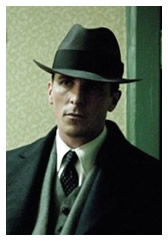
Melvin Purvis has been portrayed many times in Hollywood films. In 2009, Christian Bale played the role in "Public Enemies."


Melvin Purvis has been portrayed many times in Hollywood films. In 2009, Christian Bale played the role in "Public Enemies."
A friend and former employee of Jefferson Standard Broadcasting had a more colorful past than many of us knew. He had been a famous FBI agent who helped "get" John Dillinger and other bad guys in the 1930s, and then became a cultural icon on radio, the movies and a spokesman for a popular breakfast cereal. It was the golden era of box top prizes.
The payoff for a historian is when he discovers lots of interesting dots to connect. One recent day Jim Scancarelli, as he often does, showed up at BT Memories World Headquarters (BTMWHQ) with an old artifact, this one a Jefferson Standard Broadcasting newsletter from January 1955 called Mikes and Dollies. (Read it here.) Irma Davis, widow of the recently deceased Max Davis, had given the old faded 12-page newsletter to Marcus Hamilton, who then donated it to Scancarelli's collection. Jim, with a hunch that it may be of some interest to our readers, brought it to our door.
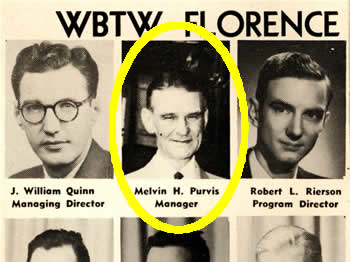 The main "story" in the newsletter dealt with WBTW, JSBC's TV station in Florence, S. C. At that time (January, 1955) the station, in operation for less than three months, had just moved into new quarters. On pages two and three there were photos of WBTW's staff.
The main "story" in the newsletter dealt with WBTW, JSBC's TV station in Florence, S. C. At that time (January, 1955) the station, in operation for less than three months, had just moved into new quarters. On pages two and three there were photos of WBTW's staff.
As we looked at the names and faces, we saw J. William Quinn, managing director (oh yeah, we remember Bill, he's Moira's dad); Melvin H. Purvis, manager (don't remember him); Robert L. Rierson, program director...Whoa! Melvin H. Purvis! Melvin Purvis?
Jim and I looked at each other in astonishment. Quick—to the Internet! Just as we thought we remembered, Melvin Purvis had been a very famous man in the 1930s. He was one of J. Edgar Hoover's top lieutenants, the Special Agent In Charge of the FBI's Chicago office, whose men brought down John Dillinger, and many other robbers and killers during the reign of the gangs in the early '30s. And...we eagerly read...Purvis was a native of Florence, S. C. where in the late 1940s and '50s he owned the local newspaper and radio station WOLS.
A famous FBI man was on the staff of "our" TV station in Florence? Both Jim and I had loitered about the premises of the Charlotte stations since the early '60s and we knew nothing of this. Why hadn't we been told? We called Bill Quinn, who confirmed that it was the same Melvin Purvis and the entire staff (at the time) was well aware of Purvis' fame and reputation.
 |
| A genuine vintage Post Toasties box top— the magic key to the vault of our dreams. |
But wait (as they say in those cheap TV spots when they're about to double the amount of junk you'll get for just $19.95)! There was more to the Purvis story, much more—and Jim, because he is an avid collector of radio memorabilia, knew all about it. Well, most of it.
It turned out that Purvis got so much credit and publicity as a crime buster (he was called "The Man Who Got Dillinger") that Hoover—jealous that he wasn't getting the acclaim—hounded Purvis out of the Bureau in 1935, and, legend has it, besmirched Purvis' reputation, making it impossible for him to get another job in law enforcement.
In a nutshell, Purvis was a press magnet. Reporters focused on the little man from South Carolina and made him into more of a hero than he actually was. Purvis didn't blatently seek the recognition, but he didn't exactly shun the publicity when it came, making Hoover furious. There is an excellent account of the incidents that destroyed their relationship in Bryan Burrough's Public Enemies: America's Greatest Crime Wave and the Birth of the FBI, 1933-34, Penguin Books, 2005.
So, to put food on the family table Melvin did something that would cause his name to become a household word, make him a hundred times more famous than the great J. Edgar, and would indelibly mark him as a hero in the minds of every child in America. Purvis sold his name and image to Post Toasties, the breakfast cereal, and to Parker Brothers, the game maker.
|
||||||||||||
| A small section of a half-page newspaper ad. Note that shields are "of polished gold bronze, satin enamel finish." It's hard to find gold bronze anymore. |
There was a time when those of us of a certain age relied on cereal box tops to make all our dreams come true. Corporations like General Foods and Kellogg's had vast armies of clever people who did nothing but dream up and implement schemes to get us little folks to eat their cornflakes and porridge. And so it was that the Post Toasties brand hired Purvis, the nation's former number one G-Man, as their spokesman and devised a very clever mechanism that kept those box tops coming in: The Melvin Purvis Junior G-Man Corps, and later the Law and Order Patrol.
If you asked a child in the late '30s who his heroes were, he might answer—not necessarily in this order—Daddy, Gene Autry, Shirley Temple...and Mr. Melvin Purvis. Purvis appeared in Post Toasties ads in newspapers and magazines in comic strip form. The ads always included a short drama in which Junior G-Men (of either gender) and Secret Operators would detect and foil some evil-doer. Then Purvis, in a little inset on the page, would urge the kids to (1) eat their Post Toasties, (2) send in box tops to become members of his club and (3) win free prizes—rings, shields, whistles, telescopes and elaborate manuals that provided the "secrets of crime detection," detailed instructions on how to communicate in code with other members, and, best of all, "how to win promotion to higher ranks!" It was a perpetual pro-motion machine: the cereal flew off the grocery shelves, box tops flew to Battle Creek, million$ flew into General Foods coffers, and cheap trinkets made of "gold bronze" flew, at a snail's pace, back to the kids.
This is the part of the story Jim Scancarelli knew all about, for, in fact, he had one or more of most of these prizes, and several of the comic strip ads and club manuals in his vast collection.
|
||||||||||||||||||
| Post Toasties' send-box-tops/get-free-prizes system was an industry in itself. See more of the prizes, ads and manuals in the Purvis Collection. |
He leapt into the Scanc-mobile, roared over to his secret lair and was soon back with these quaint relics of the past. We photographed and scanned them for your enjoyment. See the Club Prizes page and don't fail to read every word of the official Special Operators and Junior G-Man manuals. Your lives will be the richer for it.
Back to our story: Of course Purvis wasn't required to sit around in Battle Creek polishing G-Man badges. He was back in Florence, practicing law, running a newspaper and operating a radio station. He served a stint as a captain in the Army during World War II.
In 1953, when Jefferson Standard decided to apply for a TV station license in Florence, they called on Mr. Purvis, well known and respected in that community, to lend his name and credibility to the effort. When WBTW went on the air in 1954, in a building rented from Purvis, he was given a position on the staff but, according to some who remember those days, it was not clear to anyone what his duties were supposed to be. He was noticeably uninvolved with WBTW's daily operations, rarely making an appearance at the station, and eventually their arrangement—whatever it was—was allowed to lapse.
Melvin Horace Purvis died from a gunshot wound at his home in Florence in 1960. It is said the bullet came from the .45 automatic that his fellow agents gave him when he resigned. According to a PBS documentary, "Public Enemy #1" on the American Experience series, his death was declared a suicide, although it was later speculated that he may have been trying to remove a tracer bullet that was stuck in the pistol.
It later came to light that, for the 25 years between 1935 and 1960, Hoover's FBI spent many of your tax dollars keeping tabs on Purvis' every move. If his name appeared in the news or even a gossip column, the clipping went into his secret file. FBI field offices reported back to Hoover any little tidbit of rumor or hearsay that might discredit Purvis or diminish his role in the famous FBI deeds of the past. In 1936 the Bureau got all huffy over the use of the name "Junior G-Man Corps." The president of General Foods wrote to FBI Headquarters, promising that, in the future, all Post Toasties ads would emphasize that Purvis was a former G-Man and was no longer connected with the FBI. Perhaps that is why the Corps was renamed the "Law and Order Patrol."
Hoover had put the word out: get me everything on Purvis. Early in 1954 his eager eyes fell upon this tip, which involved our parent company, Jefferson Standard:
"On 2/18/54, the Assistant Attorney General, Criminal Division, furnished a letter [to the Bureau] dated 2/5/54 from [name not revealed]. The lengthy letter makes reference to Bureau personnel and the "Brink Robbery" and the following of interest to this summary is quoted.
"You may check where Mr. Melvin Purvis, came across so much money in 1953. He paid $350,000.00 deposit on the franchise on the new Television Station that is going through Jefferson Standard. Also paid City Councilman Stone, $50,000.00 to drop his application in for the same station. I do know Mr. Purvis in 1950, 1951 and 1952 was hunting for money because some of his radio announcers at W.O.L.S. had to find other jobs because they were not making enough money to take care of their families. In 1953 Mr. Purvis and Chief Price, & Ken Corbit, became very good friends."
(Purvis FBI file, Part 1b, p.40)
Apparently that information was unreliable, for nothing further is mentioned in the file. At that point, Purvis was a consultant and perhaps an attorney for the company, and the deposit referred to may have its down payment to RCA and other equipment manufacturers.
The Bureau never missed an opportunity to be mean and petty in any situation involving Purvis. In 1953 CBS was preparing a "You Are There" program on John Dillinger for broadcast on February 22. Four days before the broadcast date:
"...it was learned that the program ... was inspired by Melvin Purvis and because of Purvis' interest in the script, the CBS-TV technician was not given a detailed tour of the NY Office."
(Purvis FBI file, Part 1a, p.42)
There were many instances over the years where authors, networks or movie studios were considering books or scripts based on Purvis or his version of the crime stories. Each time the FBI moved quickly to thwart the project, and many times it succeeded.
Even until Purvis' death in 1960, he was under scrutiny, if not surveillance. Nothing was too insignificant. Details of his health were noted and filed away in Washington.
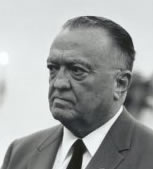 |
| J. Edgar Hoover |
When the news of his passing flashed across the land (it got wide coverage), a few Purvis admirers and colleagues inquired of the Washington office as to where flowers and memorials could be sent. The FBI's official response was that the Bureau "thought" that Purvis might have lived in Florence, S. C., when they knew his address down to the last detail. Neither Hoover nor his lieutenants sent flowers or a message of condolence to the bereaved family. The Bureau's official stance was, "Melvin who?"
About a month after Purvis' funeral, J. Edgar Hoover received this stinging telegram from Purvis' window, Rosanne.
"We are honored that you ignored Melvins death. Your jealousy hurt him very much but until the end I think he loved you.
{signed} Rosanne Melvin Jr Alson and Christopher Purvis.
Scribbled at the bottom of the telegram was this spiteful observation written by Hoover or someone close to him:
"It was well we didn't write as she would no doubt have distorted it."
(Purvis FBI file, Part 1b, p.40)
Long after Hoover died in 1972, the Bureau continued to get inquiries about Purvis that would have driven J. Edgar up the wall. People working on their family trees would request information on Purvis' ancestors. Would-be authors asked for his work history with the FBI and for detailed accounts of his role in all those famous cases. Of course, all these requests were brushed off. During Hoover's reign these supplicants would get a "Mr. Hoover is out of the city" letter from an underling.
Lest anyone forget that Purvis was in bad odor within the organization, it was commonplace, at the bottom of every internal memo pertaining to Purvis (at least those included in his file), the following was added:
"Note: Correspondent's inquiry concerns former SA Melvin H. Purvis, Jr., who EOD 2/4/27, resigned 8/5/35, and committed suicide 2/29/60 (Bufile 67-7489). He received substantial publicity over the years and constantly capitalized on his FBI experience." (Emphasis ours.)
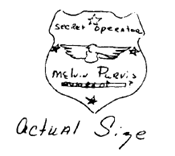 |
| Mrs. Thompson's drawing |
Years later, in 1984, Mrs. Robert Thompson of Moore, Montana, wrote that her husband had found Mr. Purvis' badge! She wanted to know exactly when Agent Purvis had been in Montana, as "it isn't every day that someone finds an FBI badge in their yard." She carefully described the badge and even enclosed a crude drawing of it. The badge displayed the words "Secret Operator - Melvin Purvis Law and Order Patrol." It was one of those box top prizes. Someone at the Bureau had to take time out from his busy schedule of apprehending perpetrators to explain to the woman about the Post Toasties ad campaigns 40 years before. (Purvis FBI file, Part 1b, p.86)
The latest chronicle of Purvis' exploits is the 2005 book The Vendetta, by Melvin's son Alston, who contends that Hoover hounded and smeared his father for the rest of his life. (In 1938 Melvin himself wrote of his experiences in a book titled American Agent. Although it has been out of print for decades, you can still find a few copies available on Amazon.com.)
In 1968, after 14 years of operation, Jefferson sold WBTW to another broadcast company and severed its ties to Florence.
Today the Post Toasties brand is owned by Kraft Foods, which also makes weiners, Jell-O, beer, cheese, coffee, cookies, rice, cigarettes and marshmallows, although, one hopes, not in the same factory.
Here are photos of just a few of the prizes for members of Melvin Purvis' Junior G-Men and the Law-and-Order Patrol (also see the prize catalog). By sending in Post Toasties box tops you could obtain rings, badges, guns, siren-whistles, decoder wheels, etc.
|
|||||||||||||||||||||||||||||||
|
|||||||||||||||||||||||||||||||
|
|
||||||||||||||||||||||||||||
| Junior G-Man Shield | Chief Operative's Shield | ||||||||||||||||||||||||||||
Junior G-Man of the Air Emblem |
|||||||||||||||||||||||||||||
 |
|||||||||||||||
Law and Order Patrol |
Junior G-Man Ring | ||||||||||||||
 |
|||||||||||||||
| Girls Junior G-Man Emblem | |||||||||||||||
|
|||||||||||||||||||||||||||||||||||||||||||||||||||||||||||||||||||||||||||||||||||||||||||||||||||||||||||||||||||||||
 |
Prize Catalog — You could, for only eight box tops, get a "handsome simulated alligator skin" wallet with an isinglass "window" inside in which you could display that photo of your secret heart throb, actress Ann Rutherford, although it was made to fit your Roving Operative's Secret Passport (three more box tops—does it never end?). |
 |
Junior G-Men Manual of Instructions — If you don't know how to "judge and compare fingerprints," this is the manual for you. Were you aware that every fingerprint belongs to one of only four classes: whorl, arch, loop and composite? You cannot get this information just anywhere. It is stunning the secrets this former ace G-Man reveals. |
 |
Law-and-Order Patrol Secret Operators Manual — As a G-Man, Purvis learned a lot of tricks of the art of disguise: "Suppose you are being followed. You are wearing a cap which is dark brown. Now if you turn a corner quickly, shove the dark brown cap into your pocket and put on another of an entirely different color, you have an excellent chance of making a leisurely getaway." And wait 'til you read how to surround a house! |
A reader, Kathryn Birdwell Wester, sent us this "official" certificate. Her grandfather had been appointed to Captain back in the '40s. She wondered if the document might be a "rare find." We doubt it, inasmuch as there are hundreds of Captains still operating out there. She said her grandfather grew up in a sharecropping family in East Texas and "I'm sure that receiving ANYTHING in the mail was a treat!"
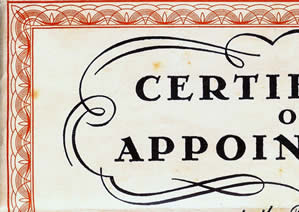 |
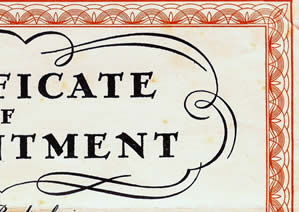 |
||
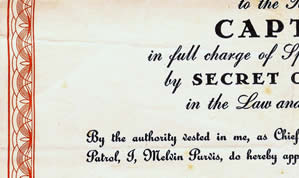 |
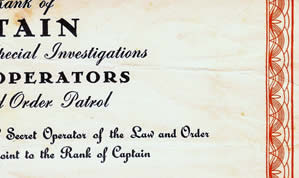 |
||
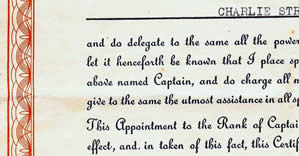 |
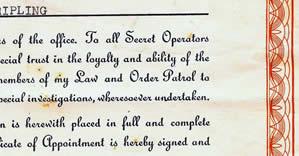 |
||
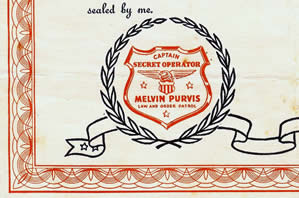 |
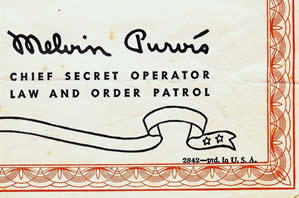 |
||